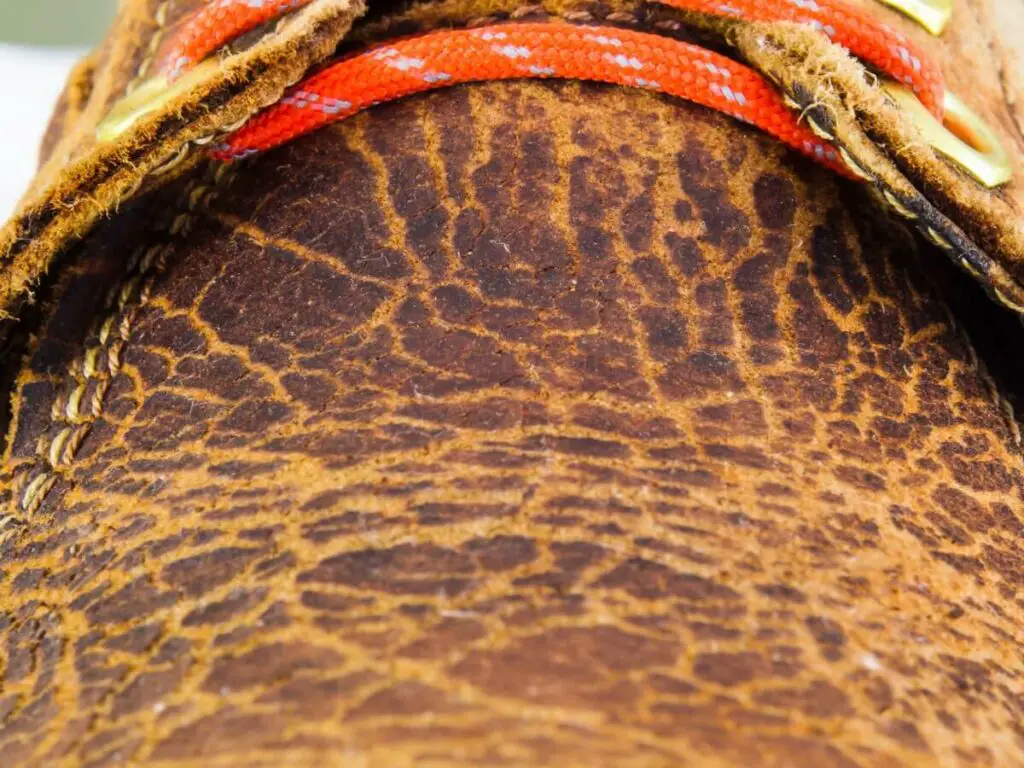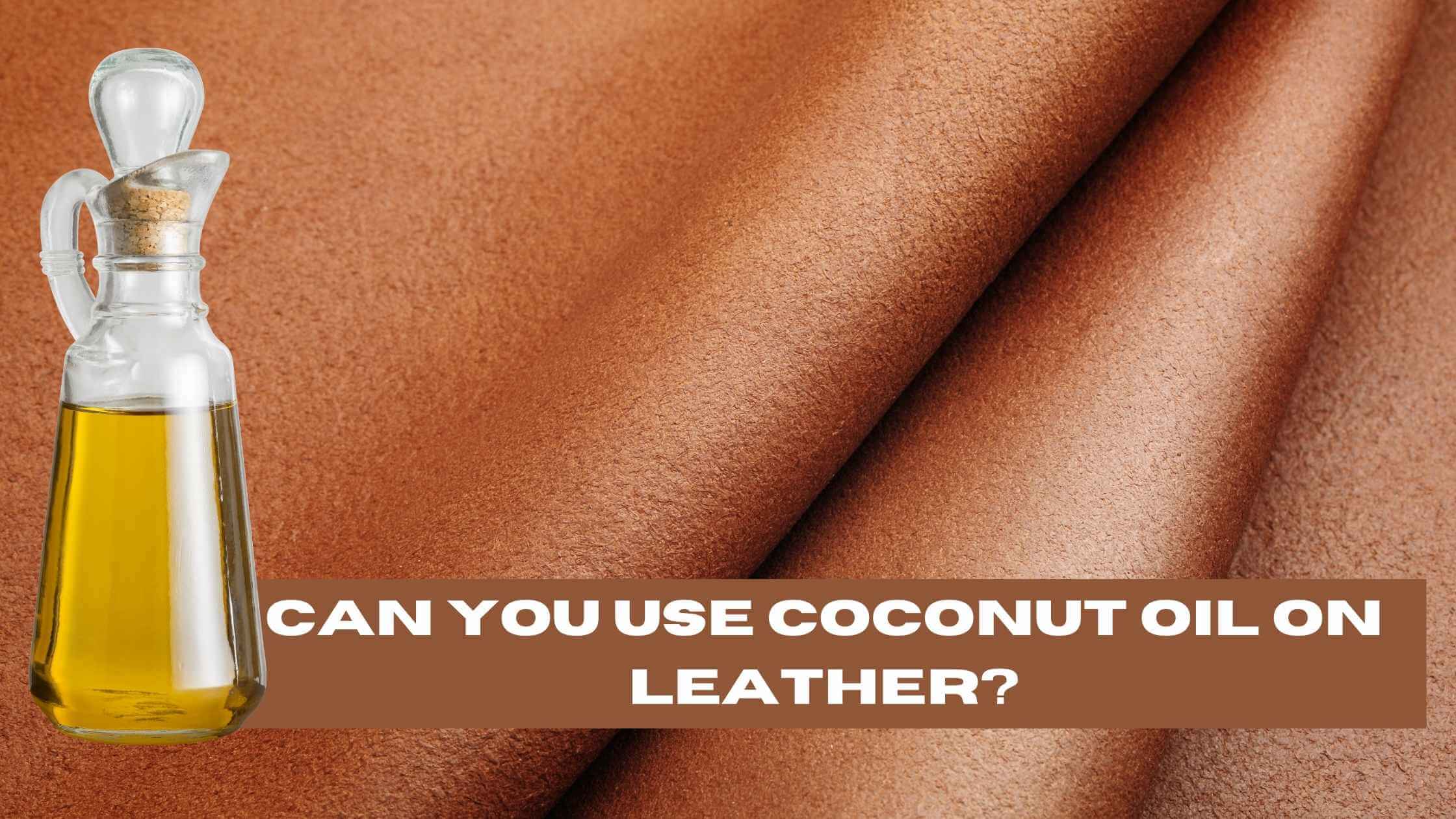I’ve been working with leather for a long time and over the years, I’ve encountered many products claiming to be the best for leather care. Today, I want to share my firsthand experience and insights on using coconut oil on leather. Let’s dive in!
You can use coconut oil on leather without damaging it, but it’s not the best product if you have other choices. Coconut oil can offer a small amount of waterproofing and softening potential, but its effects tend to be very short-lived. Even if you apply coconut oil perfectly, you’ll still find its darkening power to be temporary, and it can leave a spotty appearance when its effects fade.
Can Coconut Oil Benefit Leather?
Coconut oil is renowned for its varied uses in skincare and cooking, but does it work wonders for leather? While it doesn’t damage leather, it’s not always the first choice for leather care.
Fun Fact: Coconut oil has been used as a natural remedy for many ailments and as a beauty product for centuries.
Here’s what I’ve discovered over time:
- Short-term Effects: Coconut oil does provide a brief period of waterproofing and can soften leather. Yet, these effects don’t last very long. It can darken leather momentarily, but it reverts to its original shade after a while.
- Appearance: If you’re particular about the uniform appearance of your leather items, be wary. Coconut oil can leave a spotty look once its effects wear off.
- Cleaning Abilities: I’ve occasionally used coconut oil to clean my leather tools and workshop surfaces. It does help in removing glue residues and stains. But remember, there are better-cleaning agents explicitly designed for leather.
Pro Tip: If you decide to clean leather with coconut oil, ensure you give it ample time to sink in to avoid sticky residue.
Moisturizing Leather with Coconut Oil
Leather, like our skin, needs hydration. While coconut oil does moisturize, it can block leather’s pores, affecting its breathability. So, although coconut oil can provide short-term moisturizing benefits, there are better alternatives tailored for leather care.

The Protective Aspect: Is Leather Safe?
Using coconut oil won’t damage your leather items. However, one downside I’ve noticed, especially with my leather shoes, is that they become more prone to scuffs and scratches after coconut oil application.
Benefits of Coconut Oil for Leather
Even with some reservations, there are undeniable advantages of coconut oil:
- It’s a lightweight oil.
- It can naturally darken leather (although temporarily).
- It’s an affordable and natural option for those seeking organic leather care solutions.
Sun, Leather, and Coconut Oil
If you’re considering using coconut oil to soften leather, be cautious. One method involves warming the leather, applying coconut oil, and letting it sit in the sun. However, exposing leather to direct sunlight can cause it to fade. It’s a delicate balance to strike.
Faux Leather and Coconut Oil
Faux leather has its own care guidelines. In my experience, coconut oil can prevent crackling in faux leather. But it’s always a good idea to refer to the manufacturer’s recommendations.
Waterproofing Leather with Coconut Oil
While coconut oil offers temporary waterproofing, I’d advise against relying on it for this purpose. Purpose-made leather waterproofing treatments are more effective and longer-lasting.
Making Your Own Coconut Oil Leather Conditioner
For those keen on using coconut oil as a conditioner, here’s a recipe I’ve tried:
- Lemon Juice: 2 spoons
- White Vinegar: 1 spoon
- Coconut oil: 4 spoons
- Essential oil: A few drops (for aroma)
Blend these ingredients and apply them lightly to your leather. Remember to wipe off any excess to ensure even coloring.
Coconut Oil vs. Traditional Conditioner Oil: An Artisan’s Take
One of the frequent questions I’ve been asked is the debate over using coconut oil vs. traditional conditioner oil for leather care. Let’s dive in.
Pros and Cons of Coconut Oil for Leather
Pros of Coconut Oil for Leather:
- Softens the leather and provides a thin layer of waterproof protection.
- Hypoallergenic and will not destroy the leather because of its moisture-repelling quality.
- Convenient if you already have some in your kitchen.
Cons of Coconut Oil for Leather:
- Easy to over-condition leather goods, and it’s difficult to apply the right amount of pure coconut oil to the type of leather you have.
- Too much oil may over-soften and weaken the leather, causing it to wear out faster.
- Coconut oil is a solid at room temperature and can leave white splotches on your boots in addition to leaving the leather darker and greasier.
- Can darken or stain the leather over time.
- Leaves a spotty, patch-like appearance to the leather and sticky feeling.
- Coconut oil freezes in cold temperatures, so it might not be a right choice to use coconut oil as it will freeze very fast and leave a white cast on the leather.
Fun Fact: Did you know coconut oil solidifies below 76°F (24°C)? That's why it can be tricky to maintain its consistency while applying it to leather.
Pros and Cons of Traditional Conditioner Oil: Crafted for Leather
Over time, I’ve realized the importance of products specifically made for leather.
Pros of Traditional Leather Conditioner Oil:
- Provides conditioning to leather, helping restore some of the natural moisture to the materials.
- Proper oiling and conditioning of leather is a great way to maintain leather goods for decades.
- Enhances the appearance of leather, reviving, restoring, and bringing out the natural beauty of the material.
- Versatile and works well with various leather items including couches, car seats, bags, shoes, and belts.
- Protects leather and boosts longevity.
- Some oils, such as neatsfoot oil, are all-natural and have been used by workers for centuries.
Cons of Traditional Leather Conditioner Oil:
- Heavier oils can block the leather pores, reducing breathability.
- Some oils can leave a slick surface, which will rub off onto clothing.
- Some oils can darken the leather.
- Some oils contain synthetic or mineral-based parts to them, which can be harmful to the leather in the long term.
- Some oils can contain additives that weaken the leather fibers and can lead to cracking and faster wear.
- Some oils can resurface and stain leather after some time.
Pro Tip: Always test a small, inconspicuous patch before applying any product on the whole leather item.
Is Coconut Oil a Friend or Foe to Leather?
The digital age has bombarded us with numerous DIY hacks. And while some may work, others don’t live up to the promise.
To be honest, I’ve tried my fair share of DIY solutions, including coconut oil. While it’s okay for a quick fix, nothing beats the results from professional leather care products. They’re crafted with purpose and understanding.

